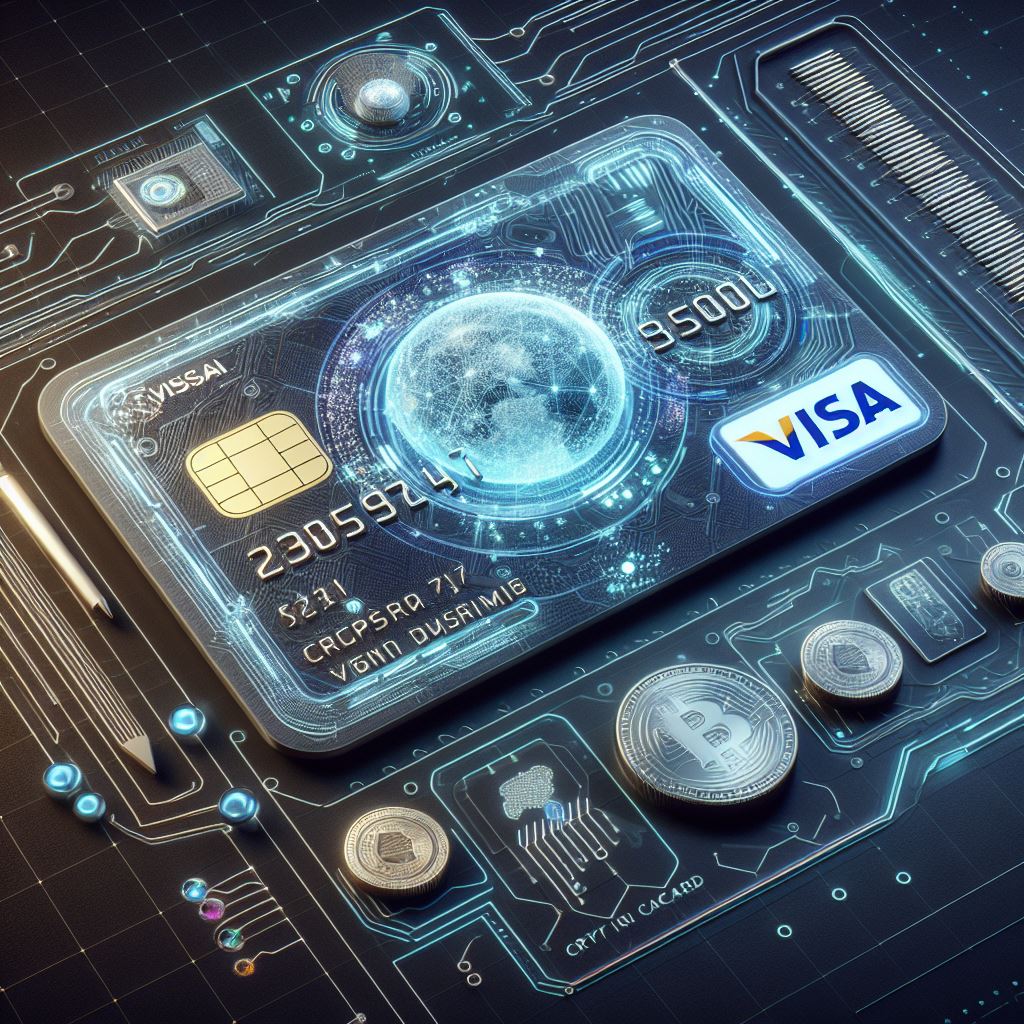Introduction and Key Takeaways
What are crypto visa cards and how do they work? Crypto visa cards allow you to spend your cryptocurrency holdings just like you would with a regular credit or debit card. Your crypto is converted to fiat currency in real-time as you make purchases.
Crypto visa cards offer a number of potential benefits:
- Ability to easily spend your crypto on everyday purchases
- Earn crypto rewards and cashback on your spending
- More privacy compared to traditional credit cards
- Opportunity to profit from crypto price appreciation by keeping your balance in crypto
- Low fees on transactions and currency conversion
Top crypto visa card options in 2023 include:
- Crypto.com Visa Card
- BlockFi Visa Credit Card
- Coinbase Card
- Binance Visa Card
- BitPay Card
Important things to consider when choosing a crypto card:
- Supported cryptocurrencies
- Fees and limits
- Rewards and benefits
- Security and insurance
- Geographic availability
Whether you’re an avid crypto user or new to the world of digital currencies, crypto visa cards are worth considering as a way to get more utility out of your crypto holdings. Just make sure to do your research and choose a reputable, secure card issuer.
What is a Crypto Visa Card?
A crypto visa card is a payment card that allows you to spend your cryptocurrency at any merchant that accepts Visa. It functions similarly to a regular Visa debit or credit card – you can use it for online purchases as well as in-store by swiping, inserting, or tapping at a payment terminal.
The key difference is that instead of drawing funds from a bank account, a crypto visa card is linked to a digital currency wallet. When you make a purchase, the equivalent amount of cryptocurrency is converted to fiat currency (like USD) in real-time to complete the transaction.[^1]
This allows crypto holders to easily spend their digital assets on everyday goods and services, without having to manually convert to fiat each time. It makes living on crypto much more seamless.
How Do Crypto Visa Cards Work?
Most crypto visa cards are preloaded/prepaid cards. This means you first transfer cryptocurrency from an external wallet to your card issuer’s wallet. Many card issuers have their own native cryptocurrency tokens that you can convert your crypto into.[^2]
When you make a purchase with the card, the card issuer converts the required amount of cryptocurrency into fiat at the current exchange rate, and sends the fiat to the merchant. So on the merchant’s end, it’s processed as a normal Visa transaction.
Here’s a step-by-step of how it typically works:
- Get approved for a crypto visa card and undergo any required identity verification
- Transfer crypto assets from an external wallet to your crypto visa card account
- Choose which cryptocurrency you want to use for transactions (many cards support multiple cryptos)
- Make purchases with your card either online or in-person
- The card issuer converts your crypto to fiat and pays the merchant
- The transaction shows up in your card account, along with the exchange rate used
Some of the top cryptocurrencies supported by crypto visa cards include:
- Bitcoin (BTC)
- Ethereum (ETH)
- Litecoin (LTC)
- USD Coin (USDC)
- Binance USD (BUSD)
Benefits of Crypto Visa Cards
Crypto visa cards provide a number of advantages and perks that make them appealing to cryptocurrency users:
- Spend crypto easily – The biggest benefit is the ability to spend your crypto on daily purchases without jumping through hoops. Just swipe your card like a regular debit/credit card.
- Earn rewards – Many crypto cards offer attractive rewards programs where you can earn cashback in the form of crypto. Rewards rates are often higher than traditional cards.[^3]
- Increased privacy – Crypto transactions provide more privacy than credit card purchases which are tied directly to your identity. With a crypto card, you have privacy at the point of purchase.
- Profit potential – By keeping your card balance in crypto rather than fiat, you have the potential to profit if the price of your held crypto appreciates against fiat currency over time.
- Low fees – Crypto cards tend to have low or no annual fees as well as low foreign transaction fees (great for international use). Currency conversion fees are also minimal.
- Fiat-free – For those who want to avoid traditional financial institutions, crypto cards allow you to essentially live fiat-free by keeping the majority of your funds in crypto.
Drawbacks of Crypto Visa Cards
As with any financial product, there are some potential downsides to be aware of with crypto visa cards:
- Volatility – Cryptocurrencies are volatile assets and their price in fiat terms can fluctuate significantly. This means the purchasing power of your card balance is subject to market swings.
- Limited acceptance – While Visa is widely accepted globally, there are still some merchants that don’t take Visa, meaning you can’t use your crypto card absolutely everywhere (but close).
- Conversion rates – When converting your crypto to fiat to make a purchase, you’re subject to the card issuer’s exchange rates and spreads which may be slightly less favorable than market rates.
- Liquidity risks – In the unlikely event that a card issuer faces liquidity issues, you may have difficulty accessing your funds or face a delay in liquidating your crypto holdings.[^4]
- Regulatory uncertainty – The regulatory landscape around cryptocurrencies is still evolving. Future regulations could potentially impact the functionality or existence of crypto cards.
How to Choose a Crypto Visa Card
With more and more crypto visa cards coming to market, it’s important to compare the different options and choose the one that best fits your needs. Here are the key factors to consider:
- Supported cryptocurrencies – Check which cryptocurrencies you can use to load your card and which ones you can convert between. The more options, the better.
- Fees – Look at the card’s fee schedule including any annual fees, ATM withdrawal fees, currency conversion fees, and crypto liquidation fees. Prioritize cards with low costs.
- Rewards – Compare the cashback rewards rates and other perks like airport lounge access or rebates on streaming services. Pick a rewards program that matches your spending habits.
- Limits – Check the maximum balance you can hold on the card as well as daily/monthly spending and ATM withdrawal limits to ensure they align with your normal usage.
- Security – Prioritize card issuers that follow strict security practices like keeping a reserve to match customer balances, using industry-standard encryption, and offering fraud protection.
- Insurance – Some crypto card issuers have FDIC insurance on USD balances while others may have private insurance policies. Understand what protections are in place.
- App and UX – Compare the quality of the card issuer’s mobile app and user experience for aspects like managing your card, tracking rewards, and viewing transaction history.
- Reputation – Stick with crypto card providers that have a solid track record and positive customer reviews. Avoid companies with a history of data breaches, hacks or liquidity issues.
- Geographic restrictions – Confirm that you can apply for and use the card in your country of residence as some cards are geo-restricted due to regulatory reasons.
Top Crypto Visa Cards in 2024
The crypto visa card landscape is rapidly evolving, with new cards launching regularly. Here’s an overview of some of the top options available in 2024:
- Crypto.com Visa Card
- Cashback rewards up to 8% paid in CRO token
- $0 annual fee
- Metal card options
- Supported cryptos: BTC, ETH, LTC, USDC, CRO and 90+ others
- Free Spotify, Netflix and Amazon Prime rebates on some tiers
- BlockFi Visa Credit Card
- Flat 1.5% cashback rewards paid in BTC or ETH
- No annual fee or foreign transaction fees
- Credit limit up to $25,000
- Earn 3.5% back in first 90 days (capped at $100)
- Coinbase Card
- Up to 4% cashback on purchases
- No annual fee
- Spend directly from your Coinbase account balance
- Supported cryptos: BTC, ETH, LTC, BCH, XRP, XLM and more
- Binance Visa Card
- Up to 8% cashback paid in BNB token
- No annual, foreign transaction or currency conversion fees
- Free virtual card option
- Supported cryptos: BTC, BNB, ETH, XRP, BUSD and more
- BitPay Card
- Instant reloads from your BitPay wallet balance
- $0 annual fee
- Digital and physical card options
- Supported cryptos: BTC, ETH, WBTC, BCH, BUSD, GUSD, PAX, XRP
- Nexo Card
- Instant 2% cashback on every purchase
- $0 annual or FX fees
- Starts at $0 with no monthly or annual fees
- Supported cryptos: BTC, ETH, XRP, NEXO tokens and 40+ others
- Crypto credit lines available
Security and Insurance
Security is paramount when it comes to crypto visa cards, as you’re trusting a company with custody of your digital assets. Reputable card issuers use a range of security measures to protect customer funds:
- Cold storage – User crypto balances are often held offline in ‘cold storage’ hardware wallets to protect against hacking attempts. Only the required amount to cover transactions is held in online ‘hot wallets’.[^5]
- Private keys – The private keys required to move cryptocurrency funds are kept securely by the card issuer and never shared with third parties.
- Two-factor authentication – Most crypto cards require 2FA when logging in or transacting above certain amounts. This protects against unauthorized access.
- Address allowlisting – Many cards only allow withdrawals to pre-approved wallet addresses that you allowlist, preventing unauthorized crypto transfers out.
- Insurance – Some card issuers hold private insurance policies to cover user funds in the event of a hack, theft or issuer insolvency. For example, Coinbase holds all USD customer balances in FDIC-insured accounts.[^6]
While these measures significantly reduce risks, it’s important to remember that crypto assets are not afforded the same consumer protections as money held in a bank account. There’s always some level of risk when a third party takes custody of your crypto.
For maximum security, some users prefer to liquidate their crypto visa card balance frequently, keeping only small amounts on the card at a time. This limits the potential loss if the card issuer faces issues.
Tax Implications
It’s important to understand the tax implications of using a crypto visa card, as transactions may be considered taxable events in some jurisdictions like the US.
When you load cryptocurrency onto a visa card, you’re essentially selling that crypto in exchange for a cash balance, gift card or cash-equivalent value with the card issuer. If you’ve realized capital gains on that crypto (meaning it appreciated in value while you held it), that’s considered a taxable event and you may owe capital gains taxes.[^7]
Similarly, when you spend crypto with a visa card, that’s also considered a sale of crypto which could trigger capital gains taxes if the crypto you’re spending is worth more than what you acquired it for.
Some key tax considerations:
- Record keeping – Keep detailed records of your crypto purchases, sales and cost basis. Many card isuer apps provide CSV exports of your transaction history.
- Tax software – Use crypto tax software like CoinTracker or TokenTax to automatically calculate your capital gains and generate tax reports based on your card transactions.
- Consult a CPA – Work with an accountant well-versed in cryptocurrency and familiar with the tax laws in your jurisdiction. They can help ensure you stay compliant.
- FIFO accounting – Most CPAs recommend using ‘First in, first out’ accounting for calculating cost basis on your crypto card sales. This means the crypto you acquired earliest is sold first.
The specific tax rules vary by country, so it’s important to understand the regulations where you live. But in general, using a crypto visa card does have tax implications that are important to plan for.
Crypto Visa Cards vs Other Crypto Cards
Visa is just one of the payment processors that crypto cards can be issued on. Some other options include:
- Mastercard – Wirex and Uphold offer crypto cards issued on the Mastercard network. They function very similarly to Visa cards.
- UnionPay – Some crypto cards aimed at the Asian market run on China’s UnionPay network. An example is the Paycent card.
There are also some crypto cards not issued on traditional payment networks at all, such as:
- Coinbase Card – This runs on the Coinbase network and can only be used at merchants that directly accept crypto through Coinbase Commerce.
- BitPay Card – This connects directly to your BitPay wallet balance for payments, rather than running on Visa/Mastercard rails.
The benefit of crypto Visa and Mastercard products is near-universal acceptance – both payment networks are accepted by over 60 million merchants worldwide.[^8] Non-traditional crypto cards may have more limited acceptance.
However, the non-traditional cards tend to have lower fees, since there are no interchange fees paid to Visa/Mastercard. So there are tradeoffs between flexibility and cost to consider.
The Future of Crypto Visa Cards
The crypto visa card space is rapidly evolving. Here are some key trends to watch:
- More coin support – Expect cards to support a wider range of cryptocurrencies beyond just Bitcoin and Ethereum. Stablecoins like USDC are especially useful for mitigating volatility.
- Improved rewards – Cashback rewards programs will likely become more competitive, with higher rates and more bonus categories. Some cards may offer choice of reward currency.
- DeFi integration – Look for more cards to integrate with DeFi protocols for features like staking rewards, liquidity mining or token swapping directly from the card interface.
- Mainstream adoption – As crypto goes mainstream, crypto visa cards will likely become a popular onboarding tool for new users. Expect more big banks and fintech companies to launch products.
- Regulatory clarity – Clearer regulation of crypto visa cards will help boost consumer confidence and adoption. Expect more scrutiny from regulators but also formal legal frameworks.
Overall, crypto visa cards have a bright future as a killer app for bringing crypto to the masses. They provide a user-friendly bridge between the traditional financial system and the emerging world of digital assets.
While there are still some risks and challenges to navigate, crypto cards are rapidly improving in terms of usability, security and benefits. For anyone interested in living on crypto, they’re definitely worth considering.
FAQs
- Can I withdraw cash from an ATM with a crypto visa card?
Yes, most crypto visa cards allow you to withdraw cash from an ATM, though there are usually daily/monthly limits and fees may apply. Check your card’s fee schedule and limits.
- What happens if my crypto visa card is lost or stolen?
Contact your card issuer immediately to report a lost or stolen card. Most will freeze the card and issue you a replacement. You may be liable for some unauthorized charges but many cards have zero liability protection.
- Can I use a crypto visa card anywhere Visa is accepted?
In most cases, yes – that’s the beauty of crypto visa cards. You can use them at any of the 60+ million merchants worldwide that accept Visa.[^9] The only exceptions may be at gambling sites, adult services or other high-risk merchants.
- Do I need to do a credit check to get a crypto visa card?
Most crypto visa cards don’t require a credit check since you’re not being extended a line of credit – you can only spend up to the balance you load onto the card. However, some cards like the BlockFi Bitcoin Rewards Credit Card do require a credit check since it’s a true credit card.
- What fees do crypto visa cards charge?
Fees vary by card but common ones include:
- Annual fee – Some cards charge this, others don’t
- ATM withdrawal fees – Typically a few dollars per withdrawal
- Foreign transaction fees – Usually lower than regular credit cards
- Crypto liquidation fees – A spread on the exchange rate when converting to fiat
- Inactivity fees – For not using your card after a period of time
Always check a card’s full fee schedule before applying so you know what to expect.
- How quickly do crypto visa card transactions post?
Most crypto visa card transactions post instantly at the time of purchase, with funds deducted from your available card balance in real-time. However, refunds and chargebacks can take several days to post back to your account.
- Can I get a joint crypto visa card account with someone else?
Currently, no major crypto visa cards offer joint accounts. Most only allow individual accounts. However, you can add additional authorized users to your account who get their own card that draws from your balance.
- Is it safe to store large amounts of crypto on a visa card?
There’s always some risk in trusting a third party like a card issuer with custody of your crypto. For large balances, it’s safest to store crypto yourself in a personal wallet. But for smaller spending balances, crypto visa cards are relatively low-risk, especially if you choose a large, reputable issuer.








